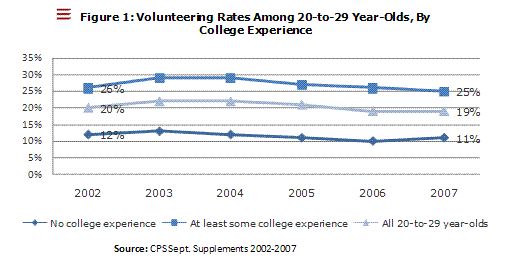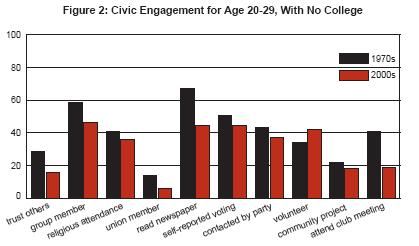Non-College Youth
This series of research products addresses: the demographics of non-college youth, voting and volunteering patterns among this demographic group, and military experience among young people with college experience.
RSSNon-College Youth
Civic Pathways Webinar
About half of young Americans have never attended college. They are less than half as likely to vote and to volunteer as their college-educated peers. These youth have few opportunities to develop civic skills and interests. Drawing on a white paper published by PACE-Philanthropy for Active Civic Engagement in October, 2009, An Inequitable Invitation to Read More >
The Internet and Civic Outcomes: Notes from the Field
To better understand how young people without college experience are using the internet and technology, we interviewed staff from YouthBuild USA, an adult learning center in Vermont, a county correctional facility in Pennsylvania, and a community-based arts and education center in Kentucky. While all four organizations used the internet or technology for educational purposes, they Read More >
Youth without college education are less likely to volunteer: New CIRCLE report examines the correlation between college experience & volunteering

Tisch College, Tufts University —Despite the upward trend in youth volunteering, young adults with no college experience are half as likely to volunteer as their collegiate counterparts, according to a new report examining the relationship between youth volunteering and college experience. Roughly 43 percent of the 20-to-29-year-old population has not attended college. Download the fact Read More >
Civic Engagement of Non-College Attending Youth
April 2009 This slideshow summarizes CIRCLE’s research to date on non-college youth. (Scroll over to reveal navigation buttons, or use right arrow to advance.)
Civic Engagement and the Changing Transition to Adulthood

January 2009 CIRCLE releases a new paper by Constance Flanagan, Peter Levine, and Richard Settersten entitled “Civic Engagement and the Changing Transition to Adulthood” (PDF). This study, funded by the Spencer Foundation, argues that life has changed dramatically for people in their 20s. Marriage, childbearing, financial independence, and other aspects of the “transition to adulthoood” Read More >




